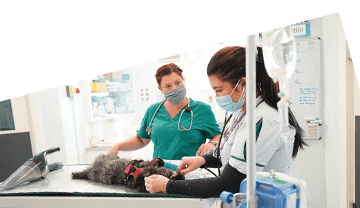
Visit our Vet Dentists in Preston & Blackpool
A combination of home care, as well as professional dental checkups with our Vet Dentists, should form part of your pet’s overall preventative healthcare routine. At Rowan Vets, we can help you with both.
Book a Vet Dentist appointment
Dental care at Rowan Vets
Rowan Vets is committed to the preservation of pet oral health through a programme of continuous professional development for our staff, and educating our clients using tools like our free pet healthcare email newsletters.
Our nursing team can also show you how to care for your pet’s teeth at home and refer you to one of our Vets should they spot any dental problems. We have invested heavily in the latest dental equipment and offer a full range of routine dental procedures on-site for when professional treatment is required.
Download our guides on:
Did you know a staggering 80% of pets over the age of three years old have dental disease that needs treating now?
How does your pet get dental disease? It typically starts with plaque – a clear layer of bacteria that forms on your pet’s teeth all the time. Plaque can be removed in one of 4 ways:
- Regular home cleaning
- Abrasion from dry (kibble) food, and some treats and toys
- Pet dental products that can be added to food or water
- Professional cleaning by a Vet Dentist
When plaque is left to build up on your cat or dog’s teeth it turns into a hard yellow/brown substance called tartar, which is accompanied by smelly breath.
Untreated tartar opens the door for other bacteria to thrive, which can cause gums to become inflamed, teeth to become loose and in extreme cases, lost altogether.
But it’s not just your pet’s teeth that are affected…
Severe periodontal disease can also lead to secondary infections in other parts of your pet’s body, including their heart, kidneys, and lungs.
Dental problems can also be very painful and will affect your pet’s quality of life. To protect their overall health and wellbeing, prevention and early treatment are key.
Spotting pet dental problems at home
Many pets will not show when they’re in pain, so it’s important to check their mouths at home regularly for signs of:
- Exceptionally bad breath
- A build-up of tartar (solid yellow/brown substance)
- Red, swollen, bleeding gums
- Broken or misaligned teeth
- Holes in teeth – typically in cats
- Overgrown teeth in rabbits and small furries
- Change in appetite/difficulty eating
- Resistance/aggression when you try to examine in or around the mouth
If you are concerned, book a dental appointment and we can advise you on the appropriate course of treatment for your pet.




